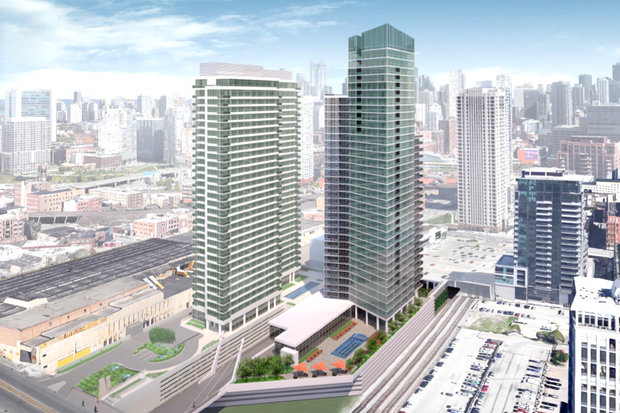
When it comes to parking management in Chicago, there have been a couple of encouraging developments recently. In September, City Council passed a beefed-up revision of the transit-oriented development ordinance, which makes it easier than ever to build dense, parking-lite developments near train stations. And, recently, Ald. Brendan Reilly (42nd) made some very sensible statements about the fact that downtown buildings shouldn't have tons of car spaces.
It's not as if Reilly is particularly progressive when it comes to transportation and public space issues. While he has supported some bike infrastructure in his downtown district, he recently tried to pass an ordinance forcing the Chicago Department of Transportation to remove the Kinzie protected lanes.
He blocked CDOT from installing Divvy stations on the Magnificent Mile, and he was was the driving force behind a new law that severely restricts the use of pedicabs in the central business district. And, last week, he lobbied to ban food carts from portions of dozens of streets in his ward, even though the carts offer consumers affordable food choices and add vitality to the public way.
But Reilly might be one of the most forward-thinking City Council members when it comes to promoting residential buildings without an excessive amount of car parking. He has encouraged developers to only build the number of spaces that is appropriate for the location of the project as well as the expected car-ownership rate of the residents. He has noted that buildings with many floors of garage parking make streets less attractive, and most downtown renters don't own cars.
For example, Cardiff Mason Development is currently pitching a 38-story residential building at 352 North Union Ave. in River West, near the Jewel-Osco at Kinzie and Desplaines. It would have 373 apartments and 158 tenant car parking spaces, for a ratio of 0.42 spaces per unit. However, DNAinfo reported, the developer originally proposed a "substantially higher" number of off-street spots but lowered the number after a meeting with Reilly.
"Some of the neighboring aldermen actually try to pack in as much parking into these structures as they can, but what I evangelize on in our ward is if you build it, they will come," Reilly told residents at a community meeting on the project on Tuesday, according to DNA. He was apparently referring to the fact that excess parking encourages more residents to bring cars to the neighborhood, which makes congestion worse. "If you're this close to central business district with lots of modes to get you there, you shouldn't have a lot of parking," he added.
Reilly noted that there's already plenty of public parking near the proposed development site. Indeed, each of the neighboring buildings have giant, publicly accessible parking garages.
And much of that existing parking is unused. The K2 apartment tower, located next door to the planned building site, has 496 residences and a 0.70 parking space-to-unit ratio. Even though that's 30 percent lower than the city's usual 1:1 parking requirement, half those spaces sit empty, according to Brian Kidd, an architect with the firm that designed that building, as well as the proposed one.
Last month, Reilly's newsletter included similar comments about a planned residential high-rise in Streeterville. It said he also requested a reduction of parking spaces for that project "not only to press down on large, multi-story parking bases, but also for practical reasons – the profile of renters downtown does not generally include car ownership."
Reilly's not pushing for fewer parking spaces in downtown developments because he's a wild-eyed, anti-car crusader. Rather, building parking-lite housing in congested, transit-accessible locations is only common sense.
![]()
Did you appreciate this post? Streetsblog Chicago is currently funded until April 2016. Consider making a donation through our PublicGood site to help ensure we can continue to publish next year. Why PublicGood? They're based in Chicago, and give you an option to pay for your own credit card processing fees.



